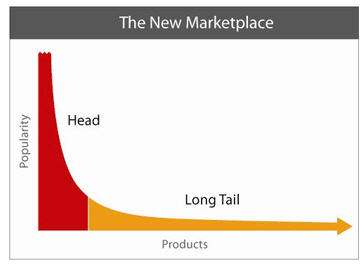The long tail: why the web loves indie filmmakers
 “Our culture and economy is increasingly shifting away from a focus on a relatively small number of "hits" (mainstream products and markets) at the head of the demand curve and toward a huge number of niches in the tail. As the costs of production and distribution fall, especially online, there is now less need to lump products and consumers into one-size-fits-all containers.”
“Our culture and economy is increasingly shifting away from a focus on a relatively small number of "hits" (mainstream products and markets) at the head of the demand curve and toward a huge number of niches in the tail. As the costs of production and distribution fall, especially online, there is now less need to lump products and consumers into one-size-fits-all containers.”
Chris Anderson, longtail.com
Wired Magazine editor Chris Anderson's landmark 2003 book The Long Tail looked at how the scale of the web and the ease of mass digital distribution creates a significant market for smaller and niche titles - be it books, music, film or special interests. Where shops have traditionally only been able to sell as much stuff as they can fit on their shelves, the web allows retailers to offer near unlimited catalogues. Indications seem to suggest that the effect of this is that far more books, films and media are sold in the 'long tail'; the part of the sales chart that tails off after it peaks on the bestsellers.
For instance, Amazon each day sells more things that didn't sell at all the day before than things that did. On web music services such as iTunes with a library of millions it transpires that almost every track has been purchased at least once. As Simon Tzu recognised in his end-of-year predictions on ShootingPeople as far back as 2004, to the independent filmmaker, traditionally left to fight for shelf and cinema space against better resourced and more crowd-friendly blockbusters, the long tail offers much hope.
While an obscure film may attract a paying audience of 100 in one city, scaled up through the web to people with similar tastes around the world, there is potentially a substantial audience. Instead of creating something generically mainstream, where there is huge competition for attention, focus on 'limited appeal' ideas and stories, traditionally seen as uncommercial, could potential be just as successful. Film libraries that have traditionally cherry-picked the most commercially viable titles for DVD release, potentially can earn as much for the collective value of their unreleased titles as their current hits.
“TV is not vulgar and prurient and dumb because the people who compose
the audience are vulgar and dumb. Television is the way it is simply
because people tend to be extremely similar in their vulgar and
prurient and dumb interests and wildly different in their refined and
aesthetic and noble interests.”
David Foster Williams, A Supposedly Fun Thing I'll Never Do Again